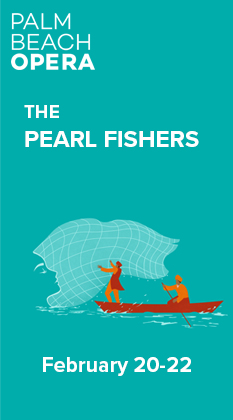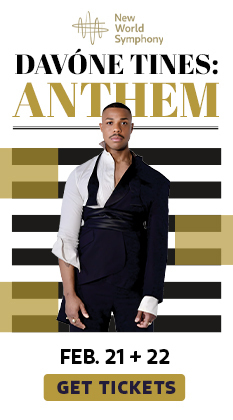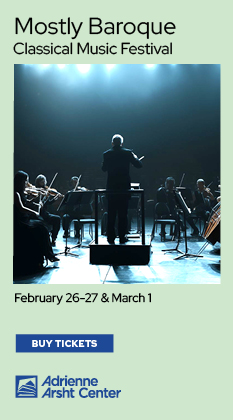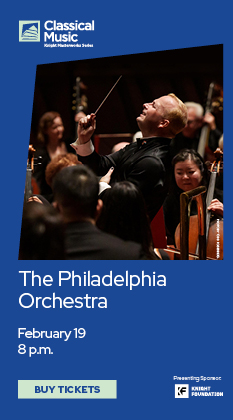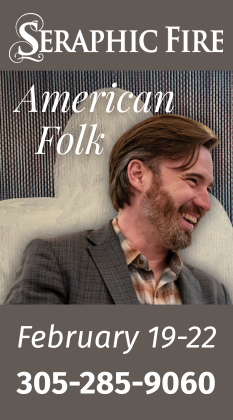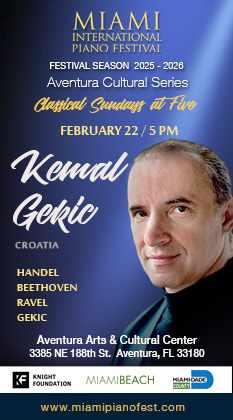Pianist Sudbin shows power, not always poetry
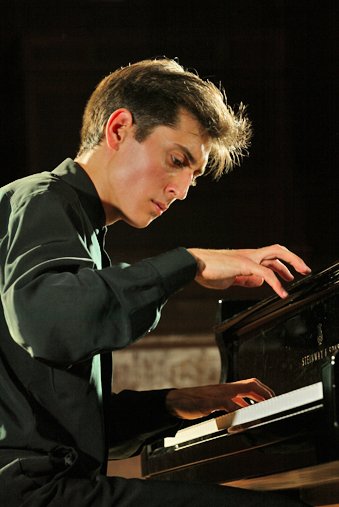 As they say in the sports world, Friends of Chamber Music of Miami is having a winning season. Julian Kreeger’s series presented charismatic singer Kate Lindsey last week, and on Feb. 2 will bring acclaimed pianist Radu Lupu to Gusman Concert Hall.
As they say in the sports world, Friends of Chamber Music of Miami is having a winning season. Julian Kreeger’s series presented charismatic singer Kate Lindsey last week, and on Feb. 2 will bring acclaimed pianist Radu Lupu to Gusman Concert Hall.
Wednesday night, it was Yevgeny Sudbin, another gifted young artist, who like Lindsey, will be performing his Miami program at a more celebrated venue: in Sudbin’s case, the Kennedy Center in Washington D.C. on Saturday—clearly the city to be this week.
With a string of impressive recordings on the Bis label, anticipation was high for the 28-year-old Russian pianist and, for the most part, Sudbin met expectations with a short but compelling recital at Wertheim Performing Arts Center.
Born in St. Petersburg and resident in London for the last decade, Sudbin possesses the kind of iron-fingered power and faultless technique one expects of any pianist schooled in the Russian tradition.
He led off with two Haydn sonatas, music that will comprise his next CD. Haydn gave lessons—briefly—to Beethoven but in the Sonata in B minor (Hob. XVI:32), one can feel the student perhaps influencing the teacher. The chromatic opening movement and frantic momentum of the concluding Presto are darker and more driven than one normally expects from Haydn’s usual good cheer. Sudbin showed a clear affinity for this repertoire, charting the drama and unsettled mercurial shifts particularly well, as with the eerily insistent middle section of the central Menuet.
Haydn’s familiar Sonata in C major (Hob:XVI:50), returns to the ebullient wit of the Papa Haydn we know, and Sudbin showed the requisite grace and quicksilver touch, creating an uncanny harpsichord-like sonority in the opening movement and rapt poise in the Adagio. Polished and exacting as Sudbin’s performance was, however, the music could have smiled a bit more.
In a program change, the pianist swapped Medtner’s Two Fairy Tales for a pair of Scriabin mazurkas. The shadow of Chopin looms large in these early works, but Sudbin deftly underlined Scriabin’s own emerging voice as the firmly projected dance rhythms turn more aggressive.
In the second half, for all his supple command and easy brauvura, there were times when one felt Sudbin’s playing a bit unvaried in its boldly projected sonority and straitened dyanamics. His two Op. 33 Chopin Mazurkas (No. 2 in D and No. 4 in B minor) banished any trace of “sickroom” Chopin, forcefully played with the national dance accents and hairpin turns seamless. But from his recordings, one expected more poetry and a subtler palette of colors and dynamics than heard Wednesday night.
So too, in Ravel’s Gaspard de la Nuit, one will rarely encounter the tortuous difficultes of the concluding Scarbo finessed with such command and structural grasp. Le gibet also possessed the requisite foreboding, control, and luminous chill.
Yet too often in these three Gothic keyboard tone poems, Sudbin’s playing failed to convey the score’s iridescence and atmosphere. Ondine , in partcular, was bland and steely, with little charm or evocative expression.
Sudbin responded to the enthusiastic applause with an encore of Rachmaninoff’s song Floods of Spring, not in the familiar Earl Wild transcription, but in Sudbin’s own brilliant retooling, showing the Russian pianist can throw off the fireworks with the best of them.
Posted in Uncategorized
Leave a Comment
Thu Jan 22, 2009
at 12:36 pm
No Comments
